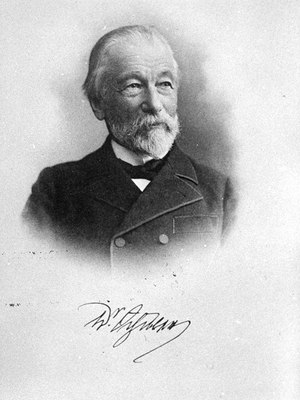
Unternavigation
Fridolin Schuler
As doctor and the first federal factory inspector, Fridolin Schuler (1832-1903) is considered to have been one of the pioneers of the Swiss welfare state.He was committed to improving the living conditions of factory workers and introducing labour protection legislation at an early stage. In his capacity as factory inspector, he played an important role in enforcing the Federal Factory Act of 1877 in the industrial sector.
Schuler was among the first generation of doctors to deal with the insights of modern physiology and hygiene. After studying medicine in Germany, he returned to his home canton of Glarus in 1855 and managed a private practice in Mollis for two decades. In his capacity as doctor, Schuler was part of the establishment in his home canton. Although he was not a lawyer, he also served as a judge between 1872 and 1890 in the cantonal court of appeals.
Because of industrialisation taking root early in Glarus, many of Schuler's patients and clients were factory workers. His daily work gave him an understanding of the health risks faced by poorer social strata. In his role as doctor, member of the cantonal medical council and member of the Swiss examination board for medical personnel, Schuler advanced a scientific understanding of medicine and opposed competition from non-academic ‘charlatans’. Soon, he developed an interest in socio-medical issues, such as combatting typhus and other epidemics. In 1876, he published the first statistics on causes of death in Glarus; his work showed that a disproportionate number of factory workers died of pulmonary tuberculosis and child mortality in working-class families was well above average. Schuler was likewise interested in nutrition. In 1884, he wrote a pertinent report for the federal authorities on ‘The Diet of the Working Class’ in which he decried the widespread consumption of spirits as a nutritional supplement.
Glarus was a pioneering canton with respect to labour protection, passing a much-noticed progressive factory act in 1864. Three years later, Schuler became a member of the cantonal factory inspectorate and was later involved in preparing the Federal Factory Act of 1877. He was elected federal factory inspector for Eastern Switzerland in 1878. He would hold this position until 1902. Factory inspectors monitored industrial companies' compliance of the stipulated working hours and factory facilities observance of safety, ventilation and cleanliness requirements. Using a combination of persuasion and pressure, Schuler ensured that an increasing number of factories were subject to these standards and that the factory owners met their obligations. His efforts soon proved successful. Even more important than legal requirements, the implementation and control measures developed by the factory inspectors played a key part in establishing labour protection in Switzerland and in the standardisation of the competitive conditions faced by industrial firms.
It wasn't long before Schuler had made a name for himself beyond his field as an expert and exponent of a ‘curative social policy’ with the aim of improving public health and the living conditions of workers. At the end of the 1880s, he was part of the expert commission tasked with preparing the introduction of a health and accident insurance. Leading up to the referendum vote on Lex Forrer in 1900, he campaigned at the front line for the proposal. In 1897, Schuler and his two inspector colleagues recommended the introduction of a 10-hour working day to the Federal Council. However, they only did so after this demand had already been picked up by the workers’ movement and left-wing parties. Schuler had a rather ambivalent relationship with the workers. On the one hand, he was committed to improving working conditions; on the other, he remained rooted to a paternalistic authority as a doctor. Besides measures for improving physical conditions, he was of the opinion that labour protection included the education of workers to pursue a ‘sensible’ way of life, such as adjusting hygienic and nutritional behaviour to the insights of modern medicine. Schuler took part in many international congresses and thereby also earned himself the reputation of being an expert on social policy beyond Switzerland’s borders. Shortly before his death, he conducted a study on night working amongst women in Switzerland for the International Labour Office in Basel.
Literatur / Bibliographie / Bibliografia / References: Siegenthaler Hansjörg (ed.), Wissenschaft und Wohlfahrt. Moderne Wissenschaft und ihre Träger in der Formation des schweizerischen Wohlfahrtsstaates während der zweiten Hälfte des 19. Jahrhunderts, Zürich 1997.
(12/2014)




